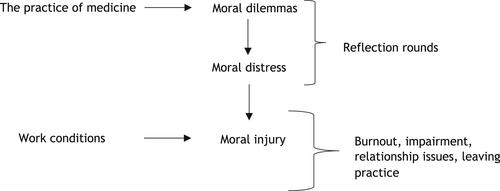Despite the known benefits of supportive work environments for promoting patient quality and safety and healthcare worker retention, there is no clear mandate for improving work environments within Learning Health Systems (LHS) nor an LHS wellness competency. Striking rises in burnout levels among healthcare workers provide urgency for this topic.
We brought three experts on moral injury, burnout prevention, and ethics to a recurring, interactive LHS training program “Design Shop” session, harnessing scholars’ ideas prior to the meeting. Generally following SQUIRE 2.0 guidelines, we evaluated the prework and discussion via informal content analysis to develop a set of pathways for developing moral injury and burnout prevention programs. Along these lines, we developed a new competency for moral injury and burnout prevention within LHS training programs.
In preparation for the session, scholars differentiated moral injury from burnout, highlighted the profound impact of COVID-19 on moral injury, and proposed testable interventions to reduce injury. Scholar and expert input was then merged into developing the new competency in moral injury and burnout prevention. In particular, the competency focuses on preparing scholars to (1) demonstrate knowledge of moral injury and burnout, (2) measure burnout, moral injury, and their remediable predictors, (3) use methods for improving burnout, (4) structure training programs with supportive work environments, and (5) embed burnout and moral injury prevention into LHS structures.
Burnout and moral injury prevention have been largely omitted in LHS training. A competency related to burnout and moral injury reduction can potentially bring sustainable work lives for scholars and their colleagues, better incorporation of their science into clinical practice, and better outcomes for patients.



